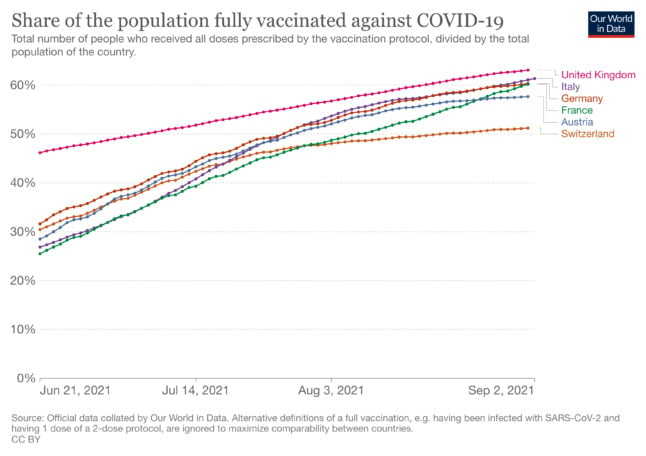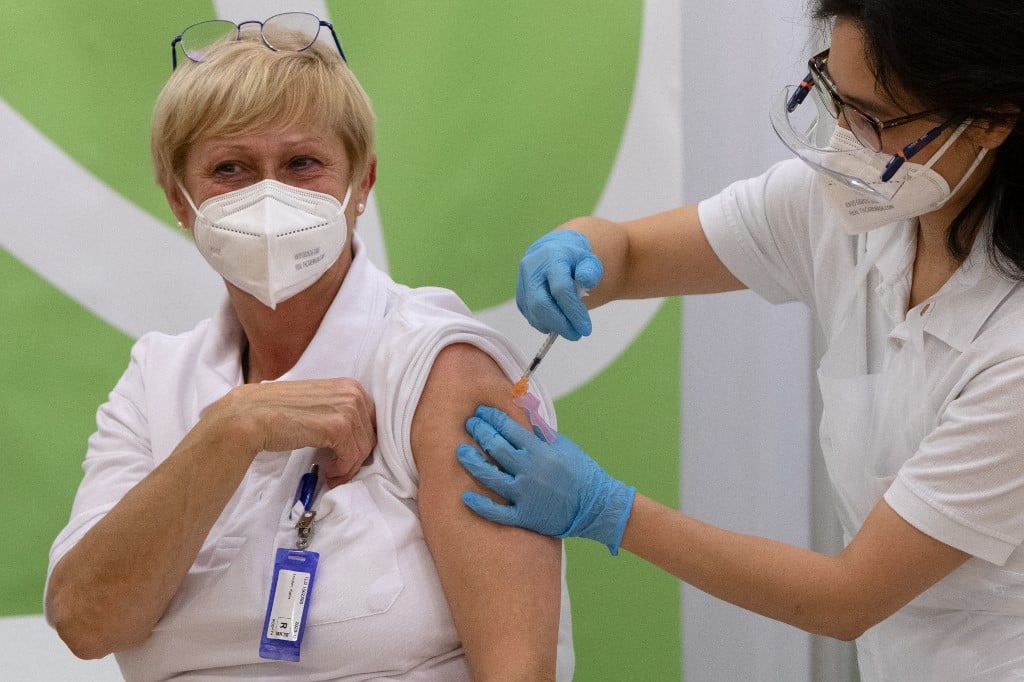Covid vaccinations: Why is Austria lagging behind and what's being done about it?

After starting well with its vaccination campaign, Austria is falling increasingly behind other European countries.
The importance placed on vaccination has increased in recent weeks due to the Delta variant of Covid-19, which is now widespread in Austria.
Studies have shown the only two doses of the vaccine have a high chance of preventing symptomatic illness caused by the disease.
Austria kept pace with most of Europe in the early months of the vaccination campaign but it has since hit a plateau over the summer months with the number of double vaccinated only creeping up slowly as the chart below shows.

The chart below reveals how the number of vaccines doses administered in Austria has fallen to one of the lowest rates in western Europe. Covid cases are once again on the rise in the country.

Austria’s Covid-19 consortium has said the country's low recent vaccination rate is “below” the worst case scenario imagined, broadcaster ORF reports.
So why are many Austrians deciding not to be vaccinated? And who are the people making up the majority of those unvaccinated?

Women are more sceptical about vaccines than men in Austria. (Photo by ALEX HALADA / various sources / AFP)
Historically sceptical
Austria is historically more sceptical about vaccinations than other European countries, according to the University of Vienna political scientist Katharina Paul, speaking to the Wiener Zeitung newspaper.
"Scepticism is generally higher, especially among women, because they have more to do with child vaccinations and feel responsible if their children experience side effects," she told the outlet.
Fertility fears
This is also backed up by a recent survey by the opinion research institute IMAS done in Upper Austria. The Upper Austria newspaper found that 340,000 Upper Austrians do not want to be vaccinated. The survey found more women than men were vaccine sceptics in the group aged under 50. It reports that many women of childbearing age fear fertility problems because of the vaccination, despite a lack of evidence to bear out this theory.
According to Paul, vaccine hesitancy among women is greater because they are more likely to be the target of misinformation - such as the claims that emerged early on that the Covid-19 vaccination had an impact on fertility - and more often affected as a group by possible side effects such as thrombosis. There is actually a greater risk of blood clots from catching Covid-19 than from the vaccine, a fact which has been underreported in the media, she tells the Kurier.

FPÖ leader Herbert Kickl has said he will not get vaccinated. (Photo by JOE KLAMAR / AFP)
Austria's far right is against vaccination
One other factor is Austria’s far right FPÖ party does not recommend the Covid-19 vaccination in Austria, and its new leader Herbert Kickl has told news outlets he is happy not be vaccinated. Rural outlets which are FPÖ strongholds typically have very low vaccination rates according to Der Standard newspaper.
Around 15 percent of people aged over 14 in Austria reject being vaccinated against coronavirus out of political conviction, according to data from the Austria Corona Panel Project at the University of Vienna. The University created the panel in May 2020 and have carried out surveys of 1,500 people since then.
Communication scientist Jakob-Moritz Eberl from the University of Vienna says getting this group to be vaccinated is "very difficult" because of their attitudes, which have been in place since the beginning of the pandemic.
Divide across Austria
There is also a divide between different areas of Austria. In August the Kurier newspaper reported some communities in the Inn and Mühlviertel, in parts of the Waldviertel, in Upper Carinthia, East Tyrol, in the Upper Inn Valley and in Flachgau and Tennengau had very low vaccination rates. In Carinthia, Upper Austria and Tyrol there were still municipalities where not even a third of the population was fully immunized.
In early August the bottom three in the vaccination statistics were Spiss in Tyrol (29.29 percent), Auerbach in the Innviertel (28.69 percent) and Stall in Mölltal (27.78 percent).
The Mayor of Spiss Alois Jäger said in an interview with Puls24 that the low vaccination rate in the village was due to people being “more free’ in the country. He also claimed the antibodies of residents of rural communities were better than those of people in the city because their children played in the mud, and said he had also not been vaccinated against Covid-19.
The low vaccination rate in Austria is alarming experts, who say the the emergence of the Delta variant may lead to intensive care units coming under pressure in the coming months due to unvaccinated patients experiencing a severe course of the disease.
READ MORE: Covid hospitalisations in Austria increasing rapidly
So what is being done about it?
Vienna has been offering walk-in vaccinations in various locations, including at the city’s film festival, St Stephen’s Cathedral, on a boat on the Old Danube and in supermarkets and shopping centres. The city has also experimented with giving people a choice of vaccines. Burgenland is introducing lottery tickets with prizes for those willing to vaccinate. It is expected that similar initiatives will be used across Austria to persuade people to get jabbed.
In some professions, mandatory vaccinations are being enforced in certain states, for example for people working in hospitals and with children.
Another idea under consideration is to have lockdowns in which only vaccinated people will be allowed to access cafes, bars, restaurants and venues - the so-called 1-G rule. A system requiring people to show evidence they have been vaccinated against, tested negative for or recovered from Covid-19 has already been in place for months in Austria.
However it’s getting harder to show you have tested negative for Covid-19, with Vienna slashing the validity time of both PCR and antigen tests this week. Politicians are considering forcing people who choose not to be vaccinated to pay for tests (currently available free of charge) which allow them to access restaurants and bars, as another incentive to get the jab.
READ MORE:
Despite these measures, Austrian researcher Niki Popper recently gave a Puls24 interview in which he said he believed around 5,000 people in Austria were being infected every day, and there would soon be an "epidemic of the unvaccinated and the unhealthy".
"The vaccination engine has not only stuttered, it came to a standstill", he said.
Comments
See Also
The importance placed on vaccination has increased in recent weeks due to the Delta variant of Covid-19, which is now widespread in Austria.
Studies have shown the only two doses of the vaccine have a high chance of preventing symptomatic illness caused by the disease.
Austria kept pace with most of Europe in the early months of the vaccination campaign but it has since hit a plateau over the summer months with the number of double vaccinated only creeping up slowly as the chart below shows.

The chart below reveals how the number of vaccines doses administered in Austria has fallen to one of the lowest rates in western Europe. Covid cases are once again on the rise in the country.

Austria’s Covid-19 consortium has said the country's low recent vaccination rate is “below” the worst case scenario imagined, broadcaster ORF reports.
So why are many Austrians deciding not to be vaccinated? And who are the people making up the majority of those unvaccinated?

Historically sceptical
Austria is historically more sceptical about vaccinations than other European countries, according to the University of Vienna political scientist Katharina Paul, speaking to the Wiener Zeitung newspaper.
"Scepticism is generally higher, especially among women, because they have more to do with child vaccinations and feel responsible if their children experience side effects," she told the outlet.
Fertility fears
This is also backed up by a recent survey by the opinion research institute IMAS done in Upper Austria. The Upper Austria newspaper found that 340,000 Upper Austrians do not want to be vaccinated. The survey found more women than men were vaccine sceptics in the group aged under 50. It reports that many women of childbearing age fear fertility problems because of the vaccination, despite a lack of evidence to bear out this theory.
According to Paul, vaccine hesitancy among women is greater because they are more likely to be the target of misinformation - such as the claims that emerged early on that the Covid-19 vaccination had an impact on fertility - and more often affected as a group by possible side effects such as thrombosis. There is actually a greater risk of blood clots from catching Covid-19 than from the vaccine, a fact which has been underreported in the media, she tells the Kurier.

Austria's far right is against vaccination
One other factor is Austria’s far right FPÖ party does not recommend the Covid-19 vaccination in Austria, and its new leader Herbert Kickl has told news outlets he is happy not be vaccinated. Rural outlets which are FPÖ strongholds typically have very low vaccination rates according to Der Standard newspaper.
Around 15 percent of people aged over 14 in Austria reject being vaccinated against coronavirus out of political conviction, according to data from the Austria Corona Panel Project at the University of Vienna. The University created the panel in May 2020 and have carried out surveys of 1,500 people since then.
Communication scientist Jakob-Moritz Eberl from the University of Vienna says getting this group to be vaccinated is "very difficult" because of their attitudes, which have been in place since the beginning of the pandemic.
Divide across Austria
There is also a divide between different areas of Austria. In August the Kurier newspaper reported some communities in the Inn and Mühlviertel, in parts of the Waldviertel, in Upper Carinthia, East Tyrol, in the Upper Inn Valley and in Flachgau and Tennengau had very low vaccination rates. In Carinthia, Upper Austria and Tyrol there were still municipalities where not even a third of the population was fully immunized.
In early August the bottom three in the vaccination statistics were Spiss in Tyrol (29.29 percent), Auerbach in the Innviertel (28.69 percent) and Stall in Mölltal (27.78 percent).
The Mayor of Spiss Alois Jäger said in an interview with Puls24 that the low vaccination rate in the village was due to people being “more free’ in the country. He also claimed the antibodies of residents of rural communities were better than those of people in the city because their children played in the mud, and said he had also not been vaccinated against Covid-19.
The low vaccination rate in Austria is alarming experts, who say the the emergence of the Delta variant may lead to intensive care units coming under pressure in the coming months due to unvaccinated patients experiencing a severe course of the disease.
READ MORE: Covid hospitalisations in Austria increasing rapidly
So what is being done about it?
Vienna has been offering walk-in vaccinations in various locations, including at the city’s film festival, St Stephen’s Cathedral, on a boat on the Old Danube and in supermarkets and shopping centres. The city has also experimented with giving people a choice of vaccines. Burgenland is introducing lottery tickets with prizes for those willing to vaccinate. It is expected that similar initiatives will be used across Austria to persuade people to get jabbed.
In some professions, mandatory vaccinations are being enforced in certain states, for example for people working in hospitals and with children.
Another idea under consideration is to have lockdowns in which only vaccinated people will be allowed to access cafes, bars, restaurants and venues - the so-called 1-G rule. A system requiring people to show evidence they have been vaccinated against, tested negative for or recovered from Covid-19 has already been in place for months in Austria.
However it’s getting harder to show you have tested negative for Covid-19, with Vienna slashing the validity time of both PCR and antigen tests this week. Politicians are considering forcing people who choose not to be vaccinated to pay for tests (currently available free of charge) which allow them to access restaurants and bars, as another incentive to get the jab.
READ MORE:
Despite these measures, Austrian researcher Niki Popper recently gave a Puls24 interview in which he said he believed around 5,000 people in Austria were being infected every day, and there would soon be an "epidemic of the unvaccinated and the unhealthy".
"The vaccination engine has not only stuttered, it came to a standstill", he said.
Join the conversation in our comments section below. Share your own views and experience and if you have a question or suggestion for our journalists then email us at [email protected].
Please keep comments civil, constructive and on topic – and make sure to read our terms of use before getting involved.
Please log in here to leave a comment.